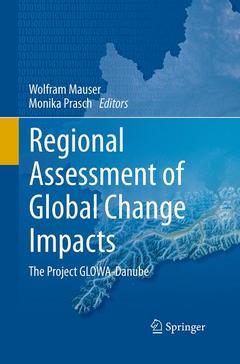Description
Regional Assessment of Global Change Impacts, Softcover reprint of the original 1st ed. 2016
The Project GLOWA-Danube
Coordinators: Mauser Wolfram, Prasch Monika
Language: English
Subjects for Regional Assessment of Global Change Impacts:
Publication date: 08-2016
Support: Print on demand
Publication date: 10-2015
670 p. · 15.5x23.5 cm · Hardback
Description
/li>Contents
/li>Comment
/li>
This book provides an overview of the GLOWA-Danube research project from 2001 to 2011, a transdisciplinary initiative which explores the future of water resources in the Upper Danube Basin. It documents the purpose and unique approach, architecture, methodologies, scenarios and results of the project, creating a scientific knowledge base for the dialogue of stakeholders and scientists. The book offers a possible blueprint for successful global change science through integrative and transdisciplinary co-creation of knowledge and orientation for regional adaptation within the context of the Future Earth research program.
Part I: Introduction.- 1. GLOWA-Danube.- DANUBIA – 2. A Web-Based Modelling- and Decision Support System to Investigate Global Change and the Hydrological Cycle in the Upper Danube Basin - Informatics Sub-Project.- 3. DeepActor Models in DANUBIA .- 4. Validation of the Hydrological Modelling in DANUBIA.- 5. The Stakeholder Dialogue in the Third Project Phase of GLOWA-Danube.- 6. GLOWA-Danube Results and Key Messages.- Part II: Data.- 7. Digital Terrain.- 8. Soil Textures.- 9. Land Use and Land Cover.- 10. Climate Stations.- Spatial and Temporal Interpolation of the Meteorological Data – Precipitation Temperature and Radiation.- 12. Ice Reservoir.- 13. Trends in Temperature and Precipitation.- 14. Hydrogeology - A Consistent Basin-Wide Representation of the Major Aquifers in the Upper Danube Basin.- 15. Mean Daily Discharge and Discharge Variability.- 16.- Population.- 17. Gross Domestic Product.- 18. Water Demand in Tourism Facilities.- 19. Agriculture.- 20. Extraction of Water for the Public Drinking Water Supply.- 21. Topsoil Organic Carbon Content.- 22. Data on Quantity and Quality Of Groundwater .- Hydropower Plants.- Part III: Models.- 24. Groundwater Recharge.- 25. Runoff Formation.- 26. Groundwater Contour Maps for the Alluvial Aquifers of the Upper Danube Basin.- 27.- Total Extraction and Total Water Supply per Community.- 28. Modelling the Effects of Global Change on Drinking Water Supply – the DeepWaterSupply Decision Model.- 29. Surface Water: Discharges and Water Quality.- 30. Mean Snow Cover Duration.- 31. Future Changes in the Ice Reservoir.- 32. Precipitation and Temperature.- 33. Two-Way Coupling the PROMET and MM5 Models.- 34. Mean Number of Storm Days. 35.- Energy: Simulation of Hydropower Generation and Reservoir Management.- 36. CO2-Fluxes and Transpiration.- 37. Plant Growth and Biomass Production.- 38. Nitrate Leaching.- 39. Agricultural Land Use and Drinking
Water Demand.- 40. Actor Model for Farmers' Crop Management Decisions - the DeepFarming Model.- 41. Water Demand by Private Households and the Public Service Sector.- 42. Modelled Domestic Water Demand 2 - The DeepHousehold Decision Model.- 43. Diffusion of Water-Saving Technologies in Private Households - The Innovation Module of DeepHousehold.- 44. Modelling Risk Perception and Indicators of Psycho-Social Sustainability in Private Households – The Risk Perception Module in DeepHousehold.- 45.Environmental Economy: Industrial Water Abstraction.- 46. Tourism Research: Water Demand by the Tourism Sector.- Part IV: Scenarios.-47. GLOWA-Danube Scenarios.- 48.- The GLOWA-Danube Climate Trends.- 49.- The Statistical Climate Generator.- 50. The GLOWA-Danube Climate Variants from the Statistical Climate Generator.- 51. Climate Variants of the MM5 and REMO Regional Climate Models.- 52.- Social Scenarios in GLOWA Danube.- Part V: Integrative Results.- 53. Impact of Climate Change on Water Availability.- 54. Scenarios for the Development of Low Flow in the Upper Danube Basin.- 55. Scenarios for the Development of Floods in the Upper Danube Basin.- 56. Influence of the Glaciers on Runoff Regime and its Change.- 57. Mean Snow Cover Duration from November to June under the REMO Regional Climate Trend and the Baseline Climate Variant.- 58. Trends in Evapotranspiration in Heterogeneous Landscapes under Scenario Conditions.- 59. Groundwater Recharge under Scenario Conditions.- 60. The Influence of Snow Cover on the Runoff Regime and its Change.- 61. Analysis of Discharge Patterns on the Danube Between Kelheim and Achleiten with a Particular Focus on Navigation.- 62. Effects of Different Scenarios on the Operating Dates of Ski Areas.- 63. Effects of Different Scenarios on Water Consumption by Golf Courses.- 64. Changes to the Quantitative Status of Groundwater and the Water Supply. 65. Societal Scenarios in DeepHousehold.- 66. Scenarios with Economic Perspectives under the Impact of Climate and Social Changes.- 67. Interventions in DeepHousehold.- 68. Effects of Climate Change on Hydropower Generation and Reservoir Management.- Estimating the Change in Groundwater Quality Resulting from Changes to Land Use and Groundwater Recharge.- 69. Effects of Future Climate Changes on Yields, Land Use and Agricultural Incomes.- 70. Scenarios of Top Soil Layer Temperature.- 71. Effects of Climate Change on Nitrate Leaching.- 72. Effects of Agro-Economic Decisions on Nitrate Leaching.- 73.- Climate-related Forest Fire Risk.- 74. Forest Fire Risk under Various Climate Trends.- 75. Effects of Future Climate Trends On Crop Management.Possible blueprint for successful, transdisciplinary future Global Change science for society
Concrete outcomes with numerous colored maps presenting the results for researchers and stakeholders
Interdisciplinary approach with social and natural sciences
Presentation of knowledge about global change impacts and adaptation on the regional level
Detailed description of structured stakeholder dialogue
Includes supplementary material: sn.pub/extras




